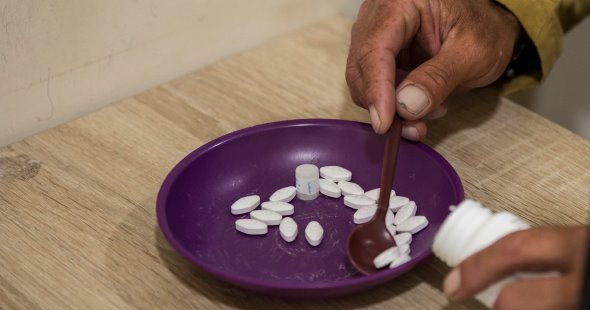Diagnostics to detect substandard & falsified antibiotics

What is this project?
This project is evaluating several different types of diagnostic technology to detect substandard and falsified (SF) antibiotics. The use of SF antibiotics may contribute to the emergence of antimicrobial resistance (AMR), and our goal is to understand how deployment of these technologies can be used to strengthen countries’ abilities to detect and remove SF antibiotics from the healthcare system.
Why are we working on it?
SF medicines harm patients and undermine confidence in medical products, healthcare professionals and health systems. SF antibiotics play an important role in AMR, as their use allows pathogens to be exposed to ineffective treatment doses, which contributes to the development of resistance.
Diagnostic tools can be used to identify SF medicines, but there is little reliable information on the performance of a growing range of devices, as well as a lack of understanding about where each technology would be best placed within the healthcare network.
What does it involve?
A 25-country landscape analysis is underway to understand in-country SF tracking and reporting mechanisms across Africa and Asia, and to inform deployment in terms of type of device, implementation setting, as well as technical support and connectivity needs.
In parallel, a laboratory-based evaluation study is being conducted in Laos to assess the performance of three types of diagnostic technology, used alone or in combination, to measure the quantity of active pharmaceutical ingredients in medicines.
If the pilot phase of this project is successful and the performance and utility of the various technologies are established, an in-field performance assessment will be conducted.
What do we expect to achieve?
Results from this project should clarify the role of each of the three types of technology and inform how each can be deployed in a complementary and connected manner. FIND will also act as a technical partner to national regulatory agencies to advise, support and help deploy selected solutions in various settings.
This work complements ongoing WHO activity concerned with policy development in this area.
What is the timescale?
These activities are expected to run for 2 years, between 2018 and 2020.
Partners and funding
Landscaping work is being conducted in collaboration with Woods International. The evaluation study is being overseen by the Lao-Oxford-Mahosot Hospital Wellcome Trust Research Unit (LOMWRU), in partnership with Becton, Dickinson and Company (BD), Thermo Fisher Scientific and Global Good.
This project is supported by the Fleming Fund, a UK aid programme.
More information
For more information please contact us.
Quick links

